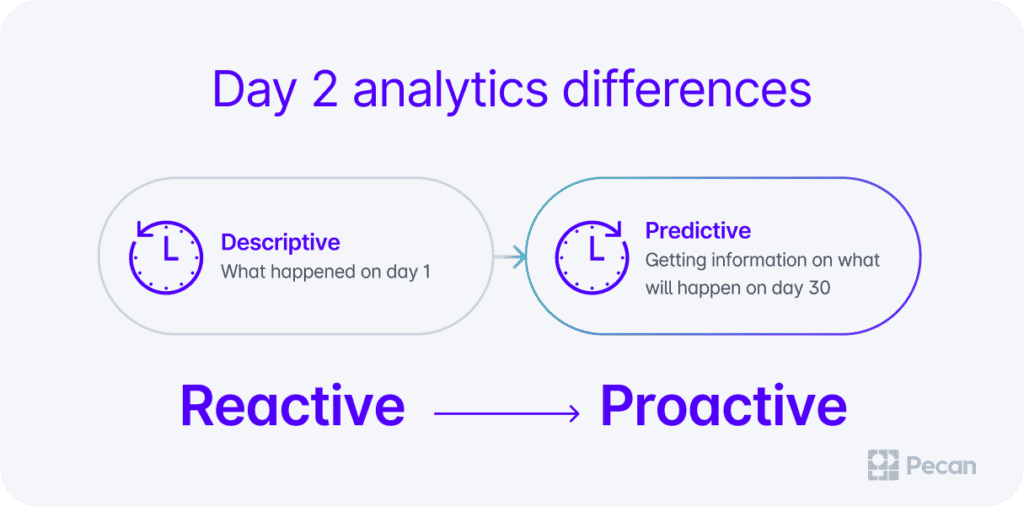They say that what happens in Vegas stays in Vegas. But in reflecting on attending the first MAU conference in 3 years, I’m convinced that everyone who attended brought a whole lot of insight and motivation back to work with them.
It was invigorating for me and the rest of the Pecan AI team to get up close and personal with nearly 3,000 marketers, vendors, partners and, yes, competitors. I appreciated experiencing firsthand the remarkable levels of transparency and mindshare that occurred.
This was my seventh time attending MAU. I want to start by quickly acknowledging Adam Lovallo and the rest of the organizers with maintaining the painstakingly cultivated atmosphere of transparency and oversharing. It was once a small show with a couple hundred folks in a single conference room at The Palms. But regardless of size, MAU has always been the one trade show of the year where leaders really lift the curtain and share the secret sauce. You won’t hear too much fluff or many empty buzzwords in the speaking sessions.
In these speaking sessions and the exhibitor hall, a couple of key themes really stood out to me, and I want to share my reflections on both.
Privacy changes have rattled the industry — and the trend continues
First, marketers around the industry are still reeling from the paradigm shift that iOS 14.5 and the SKAdNetwork created. The accelerating trend toward prioritizing user data privacy isn’t likely to change. All indications are that Google will soon follow in Apple’s footsteps. They’ll give end users more granular control over what app publishers can track, and what they can do with it.
To be sure, mobile marketing was never an easy domain. However, it was made dramatically more difficult once granular tracking of individual users across apps and ecosystems was made impossible. Users are now empowered to opt out of tracking by advertisers. With this in mind, app publishers need to come up with better ways to analyze their existing users. They can leverage that analysis to power new and different kinds of campaigns. The changes are significant. Apple only allows tracking a new user for 24 hours. Facebook/Meta locks down tracking after the initial 7 days. How is a marketer supposed to manage ad targeting for users who monetize late?
Coping with restricted data from the past by looking into the future
It’s no surprise that many businesses (not just those in the mobile industry) are beginning to shift their focus. They’re moving from backward-looking, descriptive analytics, to forward-looking, probabilistic predictive analytics.
At Pecan AI, we’re helping some of the biggest app publishers leverage their rich, anonymized first-party data to create a sort of crystal ball. Yaron Bartal, the VP of Growth at SciPlay, shared in his speaking session about how they can rapidly deploy sophisticated predictive models. That’s without leveraging in-house data science resources. This approach has allowed them to significantly reduce CPIs across their suite of apps. Importantly, they’re accomplishing that reduction in cost without compromising either the volume or the quality of the users they acquire. The high-resolution predictive events they’re generating offer a much louder signal to power their campaigns.
Be sure to check out our on-demand event with SciPlay, Meta, and Google — “How Predictive Analytics Drives Mobile Conversions & Boosts Revenue” — where we dive deeper into how SciPlay is achieving these great results.
Embracing predictable outcomes among unpredictable privacy changes
To hammer this point home: A second trend that stood out to me was that “prediction” (or predictability) has become one of the most common outcomes that vendors and publishers alike are striving to achieve. It’s critical to ascertain which behaviors app users will exhibit — long before they actually do so. Indeed, that determination seems to be the holy grail for marketers looking to augment their acquisition, monetization, and retention efforts.
From advertising partners, to the CDPs, to MMPs, leaders at nearly every speaking session I attended voiced a general desire to leverage whatever data is available to begin powering predictive insights. AppsFlyer announced the beta launch of their own predictive lifetime value (pLTV) tools. There’s clearly a demand in the market for unlocking the predictive power of available data.
This is where things get particularly exciting for me. For the last couple of years, it was nice to be the only game in town making low-code predictive analytics available to marketers and analysts (without SDKs), rather than leaving these capabilities exclusively to data scientists. It is extremely validating to have some new entrants joining the fray. A competitive rising tide will lift all ships. At Pecan, we’ve already been battle-tested and validated at scale, with some of the best and brightest publishers in the industry.
Moving forward with foresight about user behavior, even with limited data
I’m looking forward to seeing how expanding adoption of predictive analytics will support growth and innovation in the mobile industry. There’s so much potential to achieve amazing business outcomes through hyper-granular understanding of your users’ future behavior.
If you want to learn a bit more, I’d recommend watching our recent webinar, “Driving Predictable Business Outcomes.” In this event, our CEO, Zohar Bronfman, sat down with Neil Hoyne, Chief Measurement Strategist at Google. They discussed the power of predictive analytics, and explored how you’re actually much more ready than you think to get up and running.
Want to learn more about exactly how we enable teams to go from raw data to bespoke, production-ready predictive models in just 14 days? And additionally — what adopting a predictive strategy can mean for your business? The team at Pecan AI and I would love to hear from you!






